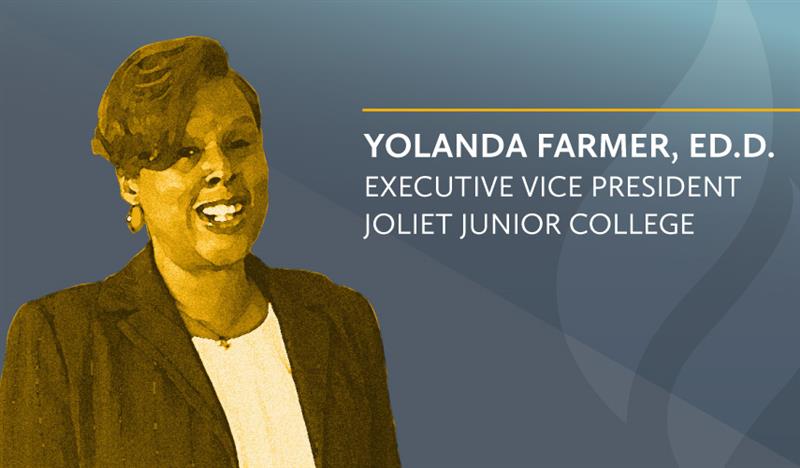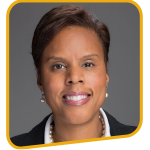
Courageous Leadership
Courageous Conversations
Courage has been a part of my personal and professional journey for most of my life. As a young girl, my grandmother often said, “Be courageous, whether you’re speaking to someone on the first floor or in the boardroom.” Over the course of my career, I came to truly appreciate the wisdom in the words she shared with me, and it gained profound meaning during my tenure at Joliet Junior College (JJC). As the first public community college in the United States, JJC carries a strong legacy in its rich history —a foundation that presents both opportunities and challenges when navigating transformation in higher education.
To me, courageous leadership means stepping into discomfort with transparency, trust, and a commitment to student success. It’s about engaging in what I call “courageous conversations”—dialogues that debunk myths, confront difficult truths, and invite vulnerability from all involved. This approach has shaped not only my leadership philosophy but also the culture of care and trust at JJC.
“Courageous leadership demands both a sharp mind and a caring heart. It’s not enough to focus on institutional policies and outcomes—we must lead with humanity, ensuring that the individuals we serve feel seen, supported, and valued. “

By Dr. Yolanda Farmer
Executive Vice President
Joliet Junior College
The concept of courageous conversations emerged over a decade ago when I was the vice president of student development. Student enrollment was a pressing issue, and the data indicated that our approach was falling short—not only in recruiting students but also in retaining them. During a conference, I remarked to a presenter that “it takes resilience and courage” to tackle these challenges effectively. That realization inspired me to bring courageous conversations to my division to address these issues.
We created spaces where my team could ask any question and share concerns openly, with the assurance that I would be as transparent as possible. This required building trust and fostering a culture of respect and shared values. These conversations quickly became the backbone of our work, evolving into a college-wide practice that has empowered staff and faculty to speak up, share insights, and embrace vulnerability for the greater good of our students.
These courageous conversations led to one of the most transformative projects I’ve led at JJC: overhauling our academic advising model. For years, our advising system blended academic and mental health counseling—a structure that left students and counselors struggling. Data painted a stark picture: only 65% of students expressed satisfaction with advising, and retention rates revealed systemic gaps.
The path to change required building what I call “cultural evidence.” Over a year, we collected data, conducted satisfaction surveys, and held roundtable discussions with stakeholders. These efforts highlighted the critical need for a specialized approach to advising. Transitioning to a coaching model, we restructured roles while ensuring all affected staff felt supported and empowered to succeed in their new capacities. The result? A 98% satisfaction rate with the new advising model and significantly improved student retention.
This journey wasn’t without resistance. Sunsetting a 50-year-old model meant challenging deeply rooted traditions and navigating complex union negotiations. However, by involving stakeholders in designing the new system and committing to preserving faculty positions, we ensured the transition honored both institutional values and individual contributions.
The Heart of Courageous Leadership: Care
A pivotal lesson I’ve learned in leadership is that trust isn’t granted—it’s earned through listening and showing you care. Early in my tenure as vice president of student development, I embarked on a listening tour across the college, an approach I later carried forward as executive vice president. This wasn’t a performative exercise but an intentional effort to build relationships, understand diverse perspectives, and align our efforts around a shared vision.
One example of this approach in action occurred when concerns arose about an external institutional technology assessment. Staff expressed fears that the process might lead to unwelcome changes or a loss of control. Instead of delegating this issue, I personally attended the team’s meeting to address their concerns directly. By listening to their anxieties and responding with care and respect, I reinforced a culture of trust. Afterward, one staff member told me, “We trust you because you show up and care for us.” Moments like these remind me that courageous leadership is grounded in relationships and authenticity.
While courage often conjures images of fearlessness, I believe it is inextricably linked to care. I have found that leading courageously requires not only intellect but also a deep sense of empathy and compassion. Early in my career, while living in a residence hall as a student affairs professional, I encountered a student in crisis. This experience taught me that courageous leadership demands both a sharp mind and a caring heart. It’s not enough to focus on institutional policies and outcomes—we must lead with humanity, ensuring that the individuals we serve feel seen, supported, and valued.
At JJC, this philosophy extends to both students and staff. While we emphasize holistic support for students, I’ve also made it a priority to foster the well-being of our employees. From celebrating individual wins to tailoring supervision to team members’ unique strengths, I strive to create an environment where everyone can thrive.
Courage for the Future
As I reflect on my journey, I’m reminded of my grandmother’s wisdom: “Be courageous, whether you’re speaking to someone on the first floor or in the boardroom.” Her words instilled in me a sense of responsibility to lead with authenticity and to use my voice to advocate for what is right. This guiding principle has shaped my leadership at JJC and continues to inspire me as I work across the college community and strive to transform the college into a place where every student and staff member can succeed.
I’ve learned that courageous leadership isn’t about having all the answers; it’s about asking the right questions, listening with an open mind, and responding with care. In a time when higher education faces extraordinary challenges, I believe that courageous conversations are the key to creating the conditions for meaningful change that not only strengthen our institutions but also enrich the lives of those we serve.

